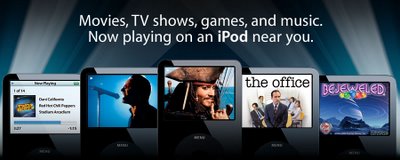 Steven Jobs couldn't keep the secret in advance of his San Francisco debut of a revamped line of iPods and more importantly -- it's gonzo entry into the movie delivery business. Apple's new iPods freshened the line, but the most significant thing was not just the fact that Apple is selling movies today but that early in 2007 it will debut a device that its hopes will shuffle the TV viewing market -- iTV. You have to read between the lines to see the rewards and risks Apple is taking.
Steven Jobs couldn't keep the secret in advance of his San Francisco debut of a revamped line of iPods and more importantly -- it's gonzo entry into the movie delivery business. Apple's new iPods freshened the line, but the most significant thing was not just the fact that Apple is selling movies today but that early in 2007 it will debut a device that its hopes will shuffle the TV viewing market -- iTV. You have to read between the lines to see the rewards and risks Apple is taking.iTV is expected to sell for $299 and it is designed to allow consumers to buy movies from the iTunes store for seamless viewing on television screens. Other companies have tried with little success. If Apple succeeds -- and they have a good chance at it -- the media market will experience significant change again with repercussions for many companies. The customer will be able to hook a computer-like device into onto its television or home theater through audio/video cables making it possible for them to access their movie and video files as they are displayed on their TVs. The system uses WiFi wireless technology and infrared remotes that attach to the TVs.
Here's what to watch: A ruckus will be raised that Apple is going to stifle the movie DVD market predominated by Wal-Mart and other discounters -- this in spite of the fact that the most popular video offering sold on iTunes -- The ABC show "Lost" -- sold more hard copy DVDs in its second season than it did the first (when it was not available on iTunes). Are the record labels listening?
Media sells media. It doesn't inhibit it. That is, the more media that is offered to the public, the more the public seems to buy. Could it be that the record labels are barking up the wrong tree when they fight their fastest growing delivery system to consumers -- digital downloads? Shouldn't they be knocking themselves out feeding the media frenzy which has been awakened by digital access? How about making songs available online for preview -- in full and for a limited number of repeats. Start there. Give some music away. The next generation will respond by -- well, buying more. Apple gives its music away so to speak by basically only profiting from hardware sales. Apple seized control of digital download pricing from the labels because it understood the business -- the risks and rewards.
Jobs is a master marketer. Now he is selling new release movies for $12.99 to start and then from $9.99 to $14.99 depending on the age of the movies. That is cheaper than the price of just-released DVDs (around $18). Yet selling movies is still a break-even situation for Apple. Feed the frenzy.
So it is that Apple's entry into selling movies is tantamount to a record label giving some music away to sell something else, say, more music, CDs, combos, etc.
Television is thinking like record labels and radio (another laggard in the digital world). TV has enough trouble with TiVo and DVRs scaring the hell out of its advertising base. Now iTV is arguably more competition for them. And You Tube is a passion among the next generation leaving a lot less TV viewing time available.
Is it lost on anyone that a computer company is defining the market for several important mediums? And Apple boldly shouts out its strategy and few, if any, competitors take heed. To take back control, media executives are going to have to think more like Jobs and take more risks. Fighting to resist change is energy poorly expended. Bold initiatives -- like embracing digital downloading and rethinking the basics of content delivery -- can set a profitable new path.
Or as Apple would say, "think differently".